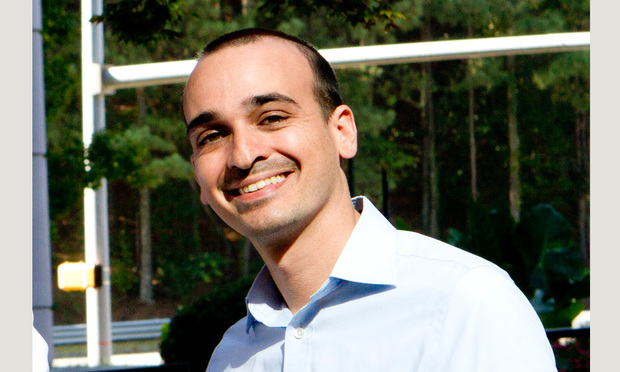 Andrew Fleischman, with Ross & Pines in Atlanta. (Photo: John Disney/ALM)
Andrew Fleischman, with Ross & Pines in Atlanta. (Photo: John Disney/ALM) Trump's Phone Call Was Neither a Secret Nor a Crime
Just as many crimes are not immoral, many immoral things are not crimes.
January 05, 2021 at 02:43 PM
6 minute read
When President Donald Trump called Georgia Secretary of State Brad Raffensperger to ask him to "find" 11,780 votes to swing the result of the election, Trump was probably not committing a crime under Georgia law. You'd need a thesaurus to list all the things wrong with the call, which was a ramshackle hodgepodge of discredited conspiracy theories, venal rib-elbowing and the occasional clearing of the throat from the president's counsel, Cleta Mitchell, for instance when the president claimed that ballots for Joe Biden were counted "three times." But in that long list of adjectives, "criminal" doesn't quite fit.
Before getting into why, remember that every criminal law on the books was written, sponsored and passed by someone who has chosen politics as their vocation. In practice, this means broad, vague laws on party to a crime, drug possession and aggravated assault, as well as extremely narrow, specific laws for the sort of things a politician might get in trouble for. That's why Georgia has a dozen statutory defenses to speeding and DUI, on behalf of all our tipsy lawmakers in a hurry, and hardly any for possession of marijuana, which is more popular with their constituents.
NOT FOR REPRINT
© 2025 ALM Global, LLC, All Rights Reserved. Request academic re-use from www.copyright.com. All other uses, submit a request to [email protected]. For more information visit Asset & Logo Licensing.
You Might Like
View All
CFPB Proposes Rule to Regulate Data Brokers Selling Sensitive Information
5 minute read

Trending Stories
Who Got The Work
J. Brugh Lower of Gibbons has entered an appearance for industrial equipment supplier Devco Corporation in a pending trademark infringement lawsuit. The suit, accusing the defendant of selling knock-off Graco products, was filed Dec. 18 in New Jersey District Court by Rivkin Radler on behalf of Graco Inc. and Graco Minnesota. The case, assigned to U.S. District Judge Zahid N. Quraishi, is 3:24-cv-11294, Graco Inc. et al v. Devco Corporation.
Who Got The Work
Rebecca Maller-Stein and Kent A. Yalowitz of Arnold & Porter Kaye Scholer have entered their appearances for Hanaco Venture Capital and its executives, Lior Prosor and David Frankel, in a pending securities lawsuit. The action, filed on Dec. 24 in New York Southern District Court by Zell, Aron & Co. on behalf of Goldeneye Advisors, accuses the defendants of negligently and fraudulently managing the plaintiff's $1 million investment. The case, assigned to U.S. District Judge Vernon S. Broderick, is 1:24-cv-09918, Goldeneye Advisors, LLC v. Hanaco Venture Capital, Ltd. et al.
Who Got The Work
Attorneys from A&O Shearman has stepped in as defense counsel for Toronto-Dominion Bank and other defendants in a pending securities class action. The suit, filed Dec. 11 in New York Southern District Court by Bleichmar Fonti & Auld, accuses the defendants of concealing the bank's 'pervasive' deficiencies in regards to its compliance with the Bank Secrecy Act and the quality of its anti-money laundering controls. The case, assigned to U.S. District Judge Arun Subramanian, is 1:24-cv-09445, Gonzalez v. The Toronto-Dominion Bank et al.
Who Got The Work
Crown Castle International, a Pennsylvania company providing shared communications infrastructure, has turned to Luke D. Wolf of Gordon Rees Scully Mansukhani to fend off a pending breach-of-contract lawsuit. The court action, filed Nov. 25 in Michigan Eastern District Court by Hooper Hathaway PC on behalf of The Town Residences LLC, accuses Crown Castle of failing to transfer approximately $30,000 in utility payments from T-Mobile in breach of a roof-top lease and assignment agreement. The case, assigned to U.S. District Judge Susan K. Declercq, is 2:24-cv-13131, The Town Residences LLC v. T-Mobile US, Inc. et al.
Who Got The Work
Wilfred P. Coronato and Daniel M. Schwartz of McCarter & English have stepped in as defense counsel to Electrolux Home Products Inc. in a pending product liability lawsuit. The court action, filed Nov. 26 in New York Eastern District Court by Poulos Lopiccolo PC and Nagel Rice LLP on behalf of David Stern, alleges that the defendant's refrigerators’ drawers and shelving repeatedly break and fall apart within months after purchase. The case, assigned to U.S. District Judge Joan M. Azrack, is 2:24-cv-08204, Stern v. Electrolux Home Products, Inc.
Featured Firms
Law Offices of Gary Martin Hays & Associates, P.C.
(470) 294-1674
Law Offices of Mark E. Salomone
(857) 444-6468
Smith & Hassler
(713) 739-1250







